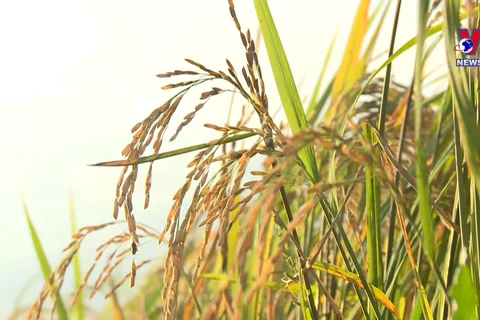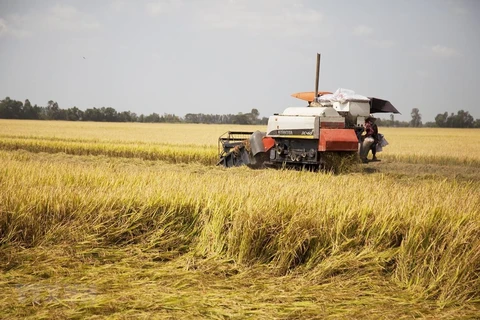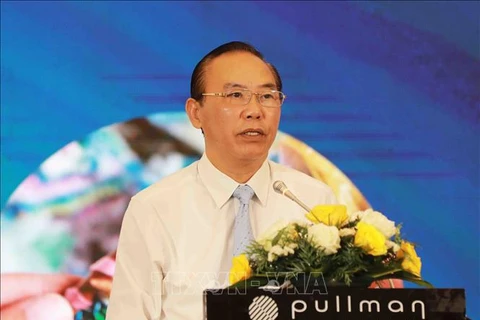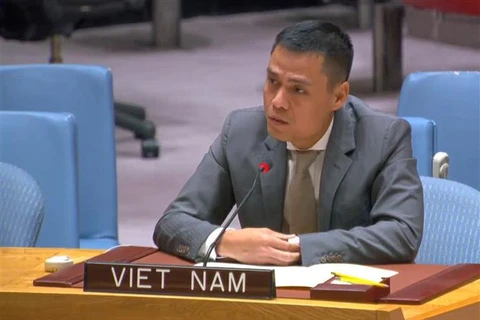Hanoi (VNA) - Prime Minister Pham Minh Chinh has signed a directive requesting greater efforts to ensure national food security and promote sustainable rice production and exports in the current period.
In the directive, the PM pointed out that in recent times, the global food trade situation has been developing complicatedly with rice prices tending to increase because of some countries’ export bans and reduction in the amount of rice sold, some others' growing purchases for rice reserves, the expired Black Sea Grain Deal, and extreme weather phenomena, natural disasters and droughts.
In Vietnam, massive trading of rice occurs in some localities, causing local supply-demand imbalance, and pushing up domestic rice prices unreasonably.
Therefore, to firmly ensure national food security in all situations, while promoting the potential and advantages in rice production and avoiding the situation of speculating and taking illegal profits, the Government leader asked ministers, heads of ministry-level agencies, chairpersons of People's Committees of provinces and centrally-run cities, the President of the Vietnam Food Association and rice exporters to take more drastic measures.
The Minister of Agriculture and Rural Development was requested to coordinate with the Minister of Natural Resources and Environment in directing localities to review planning orientations of large-scale and high-quality rice production areas to ensure the target output of over 43 million tonnes of paddy a year in the following years.
It is necessary to keep a close watch on developments in the regional and global rice markets, production situation, rice output of each variety and season in the year to balance the source of rice to serve domestic demand and exports; and at the same time, promote negotiations, and remove technical barriers to expand Vietnam's rice export markets; and promptly guide localities, businesses and farmers to strictly comply with regulations of Vietnam and importing countries.
The Minister of Industry and Trade should coordinate with the heads of relevant agencies in implementing programmes and activities to promote Vietnamese rice products and brands, making the most of incentives offered by signed free trade agreements (FTAs) in order to diversify and occupy new and potential markets and improve the competitiveness of Vietnam's rice industry.
The Prime Minister also requested the Minister of Finance and the Governor of the State Bank of Vietnam to proactively and promptly direct the implementation of price stabilisation and support measures for rice producers, exporters and traders in accordance with laws.
Attention should be paid to calculating and balancing the appropriate and effective rice reserves so as to ensure no one lack food when disasters or epidemics occur./.
In the directive, the PM pointed out that in recent times, the global food trade situation has been developing complicatedly with rice prices tending to increase because of some countries’ export bans and reduction in the amount of rice sold, some others' growing purchases for rice reserves, the expired Black Sea Grain Deal, and extreme weather phenomena, natural disasters and droughts.
In Vietnam, massive trading of rice occurs in some localities, causing local supply-demand imbalance, and pushing up domestic rice prices unreasonably.
Therefore, to firmly ensure national food security in all situations, while promoting the potential and advantages in rice production and avoiding the situation of speculating and taking illegal profits, the Government leader asked ministers, heads of ministry-level agencies, chairpersons of People's Committees of provinces and centrally-run cities, the President of the Vietnam Food Association and rice exporters to take more drastic measures.
The Minister of Agriculture and Rural Development was requested to coordinate with the Minister of Natural Resources and Environment in directing localities to review planning orientations of large-scale and high-quality rice production areas to ensure the target output of over 43 million tonnes of paddy a year in the following years.
It is necessary to keep a close watch on developments in the regional and global rice markets, production situation, rice output of each variety and season in the year to balance the source of rice to serve domestic demand and exports; and at the same time, promote negotiations, and remove technical barriers to expand Vietnam's rice export markets; and promptly guide localities, businesses and farmers to strictly comply with regulations of Vietnam and importing countries.
The Minister of Industry and Trade should coordinate with the heads of relevant agencies in implementing programmes and activities to promote Vietnamese rice products and brands, making the most of incentives offered by signed free trade agreements (FTAs) in order to diversify and occupy new and potential markets and improve the competitiveness of Vietnam's rice industry.
The Prime Minister also requested the Minister of Finance and the Governor of the State Bank of Vietnam to proactively and promptly direct the implementation of price stabilisation and support measures for rice producers, exporters and traders in accordance with laws.
Attention should be paid to calculating and balancing the appropriate and effective rice reserves so as to ensure no one lack food when disasters or epidemics occur./.
VNA
























